-
DHS report: gap in TSA badging process poses threats
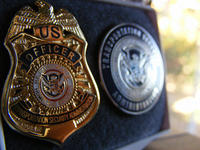
A new government report revealed that the Transportation Security Administration (TSA) is unable to accurately account for its employees who have access to secure areas in airports, resulting in a significant security gap
-
-
Pilots zip through security with expedited TSA program
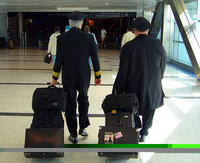
On Tuesday, the Transportation Security Administration (TSA) launched a trial program for its new screening system for airline pilots that does not require them to be scanned or searched for prohibited items
-
-
Making rail travel more reliable
U.K. researchers are collaborating with industry to develop novel optical sensors that detect when overhead power lines are likely to fail; the costly disruption to rail travel caused by the breakdown of overhead power lines could thus become a thing of the past
-
-
Secret Service gets two hi-tech buses

For President Obama’s latest three-day tour of the Midwest, the Secret Service will be using two new armored buses to provide better security; in the past, the Secret Service would lease buses when they needed them and then customize them with security and communications equipment, but officials say these measures were often inadequate
-
-
Pilots zip through security with expedited TSA program
On Tuesday, the Transportation Security Administration (TSA) launched a trial program for its new screening system for airline pilots that does not require them to be scanned or searched for prohibited items
-
-
Anonymous retaliates against BART
The hacking collective Anonymous released personal data on Sunday belonging to more than 2,000 public transport customers in the San Francisco area in retaliation for the Bay Area Rapid Transit (BART) system’s shutdown of mobile phone service on Thursday night
-
-
Aware wins TSA contract for employee fingerprint scanners
Aware Inc. recently won a contract to supply the Transportation Security Administration (TSA) with biometric fingerprint scanners to help the agency conduct employee background checks
-
-
New task force helps protect Port of Virginia
A new border security task force has been launched to help secure the Port of Virginia; the task force is comprised of ten officers and agents from a total of ten local, state, and federal agencies that will be responsible for securing the Port of Virginia against a variety of criminal acts including trade fraud, cargo theft, and the illegal smuggling of drugs, persons, currency, and weapons
-
-
Buoy system helps protect U.S. ports
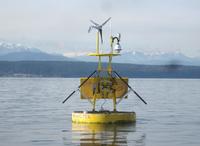
With America’s ports, waterways, and vessels handling more than $700 billion in goods annually, a terrorist attack on the system would have a crippling effect on the U.S. economy; to help mitigate these threats, Intellicheck Mobilisa has developed Aegeus, a series of buoys which have the capability of creating a surveillance perimeter that detects incoming vessels, biological substances, and even nuclear bombs
-
-
Underwater nuke detecting drone
Unmanned underwater vehicles (UUV) could soon be prowling the nation’s coastline to detect radiological and nuclear threats; the underwater drones, developed by New Jersey based Princeton Security Technologies, Inc., are equipped with radiological isotope identification hardware to monitor any changes below the water
-
-
San Francisco to install real-time surveillance on buses
Thanks to a $6 million DHS grant San Francisco’s MUNI buses will soon be equipped with a network of sophisticated high-tech video cameras that will allow the transit agency to view footage in real-time
-
-
TSA testing QR Codes on checkpoint signage
TSA will begin testing QR Codes at U.S. airports; the QR Codes are two-dimensional codes readable by barcode readers on smartphones; the codes may download, for free, from multiple sources on the Internet; when the code is scanned, the phone will take you directly to a Web page or other information without having to type any information into your phone
-
-
Making runways safer
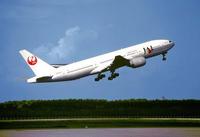
Airplanes undergo significant stresses during take-off and landing, and parts often become detached, putting subsequent runway users at risk; until now, airport staff have had to monitor runways without technical assistance — an activity that is prone to errors; a new radar system is set to increase safety at airports
-
-
Report warns Amtrak vulnerable
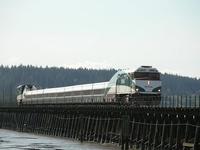
A new report by the DHS Inspector General warns that Amtrak is vulnerable to terrorist attacks, despite the $1 billion that has already been spent to bolster security; the inspector general found that DHS officials did not ensure that the money was being spent efficiently securing Amtrak’s most vulnerable stations resulting in security gaps
-
-
U.K. airports install biometric passport readers
Individuals with biometric passports from the United Kingdom or the European Union will now be able to use sophisticated automated e-Passport scanners at every major U.K. airport
-
- All
- Regional
- Water
- Biometrics
- Borders/Immig
- Business
- Cybersecurity
- Detection
- Disasters
- Government
- Infrastructure
- International
- Public health
- Public Safety
- Communication interoperabillity
- Emergency services
- Emergency medical services
- Fire
- First response
- IEDs
- Law Enforcement
- Law Enforcement Technology
- Military technology
- Nonlethal weapons
- Nuclear weapons
- Personal protection equipment
- Police
- Notification /alert systems
- Situational awareness
- Weapons systems
- Sci-Tech
- Sector Reports
- Surveillance
- Transportation
Advertising & Marketing: advertise@newswirepubs.com
Editorial: editor@newswirepubs.com
General: info@newswirepubs.com
2010-2011 © News Wire Publications, LLC News Wire Publications, LLC
220 Old Country Road | Suite 200 | Mineola | New York | 11501
Permissions and Policies
Editorial: editor@newswirepubs.com
General: info@newswirepubs.com
2010-2011 © News Wire Publications, LLC News Wire Publications, LLC
220 Old Country Road | Suite 200 | Mineola | New York | 11501
Permissions and Policies
